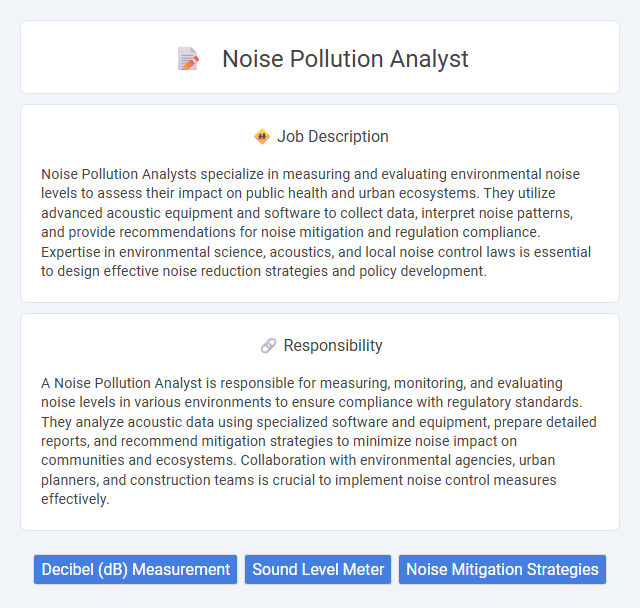
Noise Pollution Analysts specialize in measuring and evaluating environmental noise levels to assess their impact on public health and urban ecosystems. They utilize advanced acoustic equipment and software to collect data, interpret noise patterns, and provide recommendations for noise mitigation and regulation compliance. Expertise in environmental science, acoustics, and local noise control laws is essential to design effective noise reduction strategies and policy development.
Individuals with strong analytical skills and an interest in environmental science are likely suitable for a Noise Pollution Analyst role. Candidates who enjoy data interpretation and have a detail-oriented mindset may find the job fulfilling, while those sensitive to high noise environments might find the working conditions challenging. The role probably requires patience and resilience to manage complex noise data and regulatory standards effectively.
Qualification
A Noise Pollution Analyst requires a strong background in environmental science, acoustics, or engineering, with a bachelor's degree in related fields often mandatory. Proficiency in specialized software for sound modeling and analysis, such as CadnaA or SoundPLAN, is essential to assess noise impacts accurately. Practical experience in field measurements, data interpretation, and regulatory compliance ensures effective noise pollution control and mitigation strategies.
Responsibility
A Noise Pollution Analyst is responsible for measuring, monitoring, and evaluating noise levels in various environments to ensure compliance with regulatory standards. They analyze acoustic data using specialized software and equipment, prepare detailed reports, and recommend mitigation strategies to minimize noise impact on communities and ecosystems. Collaboration with environmental agencies, urban planners, and construction teams is crucial to implement noise control measures effectively.
Benefit
Noise pollution analysts likely enhance urban living conditions by identifying and mitigating harmful sound levels, which can improve public health outcomes. Their expertise may support policymakers and planners in creating quieter, more sustainable environments, potentially reducing stress-related illnesses. Employment in this role probably offers opportunities for interdisciplinary collaboration and contribution to environmental conservation efforts.
Challenge
Noise Pollution Analysts likely face challenges in accurately measuring and interpreting complex sound data within diverse environments. They probably encounter difficulties in balancing regulatory standards with real-world noise variations while advising on mitigation strategies. Navigating technological constraints and evolving environmental policies may further complicate their efforts to reduce noise pollution effectively.
Career Advancement
Noise Pollution Analysts specialize in measuring and evaluating environmental noise levels to ensure compliance with regulations and protect public health. Career advancement opportunities include roles such as Environmental Consultant, Acoustic Engineer, or Regulatory Compliance Manager, often requiring further certifications in environmental science or acoustics. Gaining expertise in advanced noise modeling software and environmental impact assessment enhances prospects for leadership positions and consultancy roles.
Key Terms
Decibel (dB) Measurement
A Noise Pollution Analyst specializes in measuring and assessing noise levels using decibel (dB) meters to ensure compliance with environmental standards. Precise dB measurement is critical for identifying noise sources, evaluating their impact on public health, and recommending mitigation strategies. Expertise in acoustic data analysis and understanding of regulatory noise limits enables accurate noise pollution management.
Sound Level Meter
A Noise Pollution Analyst specializes in measuring and analyzing environmental noise using advanced Sound Level Meters to assess decibel levels accurately. Expertise in calibrating and operating these devices ensures compliance with regulatory standards and helps identify sources of harmful noise in urban and industrial areas. Proficiency in interpreting sound data supports the development of noise mitigation strategies and enhances public health and safety.
Noise Mitigation Strategies
Noise Pollution Analysts specialize in assessing acoustic environments to identify sources of harmful noise and quantify sound levels in residential, industrial, and urban settings. They design and implement noise mitigation strategies such as sound barriers, zoning regulations, and advanced acoustic materials to reduce noise pollution and protect public health. Their expertise supports compliance with environmental standards and enhances quality of life by minimizing noise-related disturbances.
 kuljobs.com
kuljobs.com